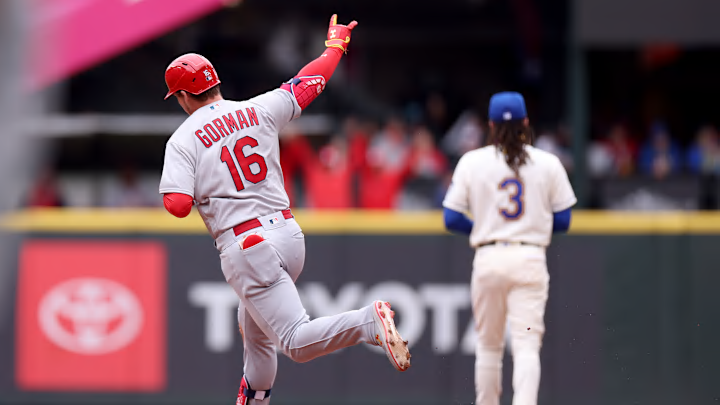As the Cardinals continue to struggle to start the season, Nolan Gorman has become the best reason to keep watching.
He was Jordan Walker before Jordan Walker, a first-round draft pick and highly touted prospect who debuted at a young age. He found some success his rookie year but, entering spring training this year, it seemed like Nolan Gorman had become a forgotten man.
Now? He’s the brightest spot in an otherwise disappointing start to the season for the St. Louis Cardinals.
To be fair, Gorman was not as ballyhooed a prospect as Walker and he had more time to develop in the minors. But as the season started last month, it was easy to forget the prospect love that Gorman once enjoyed.
Drafted 19th overall in 2018 (as the first player drafted to be born in 2000), Gorman was already the team’s second-best prospect by 2019 according to MLB.com. His power tantalized fans and scouts alike and the position switch he was forced to make from 3B to 2B didn’t seem to dull his shine.
He debuted last year and in 313 plate appearances, he managed 14 homers and finished with a .8 WAR. His defense was shaky and he struggled with his plate discipline, especially with pitches at the top of the strike zone.
A demotion back to Triple-A in September led to an offseason of questions. Was Gorman destined to be a swing-and-miss machine with occasional power? Was he overrated? Should the Cardinals trade him for pitching this offseason?
The only question surrounding him now is where this season would be without him. Gorman added further support to that notion during Sunday’s needed win against the Mariners, putting the Cardinals up for good with his three-run homer in the fourth inning. As Derrick Goold noted, those three RBIs gave him a league-leading 14 in two-out counts this year.
His improvement from last year has been drastic. His average exit velocity is 93.6 MPH, up from 89.2 in his rookie year. His hard-hit percentage is at 56.3 this year, compared to 43.3 last year. And perhaps most important given his prior struggles, his chase rate is at 20.9, an astounding drop of over 10 percentage points from last year’s rate of 31.1.
He leads the team with six homers and 22 RBIs and has already almost equaled his WAR total from last year, producing .7 so far. Good luck finding an offensive category where he’s not among the league leaders – he’s currently in the top ten league-wide for homers, OPS, and slugging percentage.
Is all of his sustainable? Only time will tell. But what’s already clear is that Gorman has become the best reason to keep watching this disappointing edition of the Cardinals. The team has won only two of seven series to start the year and is 0-7 in the first game of any series. The starting rotation has managed only three – three! – quality starts and the lineup seems allergic to any kind of production with the bases loaded.
Thankfully, Gorman has provided reason for an optimistic outlook. His production suggests he could be the third big bat this team needs and his dedication to fixing the issues that plagued him last year offers hope that he could be a lineup fixture for years to come.
“That’s a big home run,” Cardinals manager Oli Marmol said after Sunday’s victory over the Mariners. “And [Gorman] continues to take big swings for us…[h]e’s taking big swings in big moments.”
Also big? Gorman’s production in his second season, leading to renewed big expectations for him moving forward.
